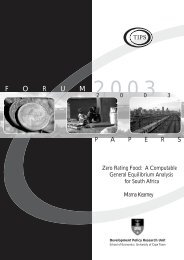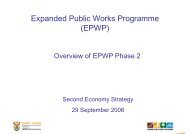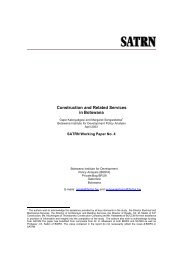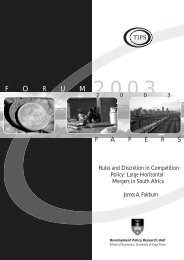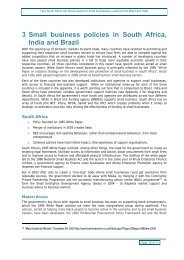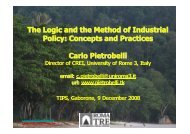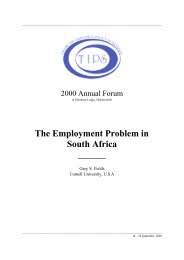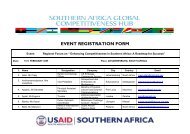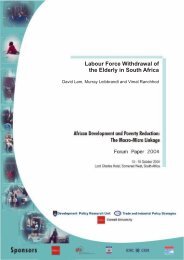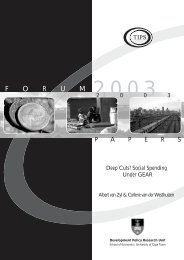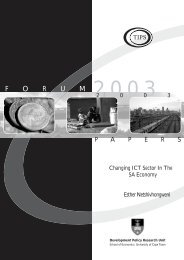Monitor Vol 39 08_Final_Nov08.pdf - tips
Monitor Vol 39 08_Final_Nov08.pdf - tips
Monitor Vol 39 08_Final_Nov08.pdf - tips
Create successful ePaper yourself
Turn your PDF publications into a flip-book with our unique Google optimized e-Paper software.
trade<br />
policy<br />
1<br />
Why OECD countries<br />
should reform<br />
Rules of Origin*<br />
by Olivier Cadot † and Jaime de Melo ‡<br />
1. Introduction<br />
Rules of origin are an integral part of proliferating free trade agreements—<br />
countries belong to an average of six, according to a recent tally by the World Bank<br />
(2005, table 2.1)—and nonreciprocal preferential trade agreements such as the<br />
Generalized System of Preferences (GSP). 1 Given the lack of progress on harmonization<br />
at the World Trade Organization (WTO) and given that regionalism is here to stay, rules of<br />
origin are likely to be increasingly important in the world trading system.<br />
The primary justification for rules of origin in preferential trade agreements is to prevent “trade<br />
deflection,” or taking advantage of low external tariffs or weak customs-monitoring capacities to<br />
bring in imports destined for more protected markets in a trading bloc (possibly after superficial<br />
conditioning or assembly). In effect, rules of origin are needed to prevent trade deflection for all<br />
*<br />
This paper was first published in the World Bank Research Observer, <strong>Vol</strong>ume 23 No. 1 (Spring 20<strong>08</strong>). The authors thank<br />
Paul Brenton and Marcelo Olarreaga for many useful suggestions and co-authors Céline Carrère, Antoni Estevadeordal,<br />
Alberto Portugal-Perez, Akiko Suwa-Eisenmann, and Bolormaa Tumurchudur for permission to draw on joint work. They<br />
also thank three referees for comments on a previous draft.<br />
†<br />
Olivier Cadot is Professor of Economics at the University of Lausanne, associated scholar at Centre d’Etudes et de Recherches<br />
sur le Développement International (CERDI), and fellow at the Centre for Economic Policy Research (CEPR) (olivier.<br />
cadot@unil.ch).<br />
‡<br />
Jaime de Melo (corresponding author) is Professor of Economics at the University of Geneva, associated scholar at CERDI,<br />
and fellow at CEPR (DeMelo@ecopo.unige.ch).<br />
With preferential trade agreements (PTAs) on the<br />
rise worldwide, rules of origin – which are necessary<br />
to prevent trade deflection – are attracting<br />
increasing attention. At the same time, preference<br />
erosion for Generalized System of Preferences<br />
(GSP) recipients is increasing resistance to further<br />
multilateral negotiations. Drawing on different<br />
approaches, this article shows that the current<br />
system of rules of origin that is used by the EU and<br />
the US in preferential trade agreements (including<br />
the GSP) and that is similar to systems used by<br />
other Organisation for Economic Co-operation<br />
and Development (OECD) countries should be<br />
drastically simplified if developed economies really<br />
want to help developing economies integrate into<br />
the world trading system. In addition to diverting<br />
resources for administrative tasks, current rules<br />
of origin carry significant compliance costs. More<br />
fundamentally, it is becoming increasingly clear<br />
that they are often designed to force developing<br />
economies to buy inefficient intermediate products<br />
from developed economies to ‘pay for’ preferential<br />
access for the final product. The evidence also<br />
suggests that a significant share of the rents<br />
associated with market access (net of rules of<br />
origin compliance costs) is captured by developed<br />
economies. <strong>Final</strong>ly, the restrictiveness of rules of<br />
origin is found to be beyond the levels that would<br />
be justified to prevent trade deflection, suggesting<br />
a capture by special interest groups. The article<br />
outlines some alternative paths to reforms.<br />
Trade & Industry <strong>Monitor</strong>



